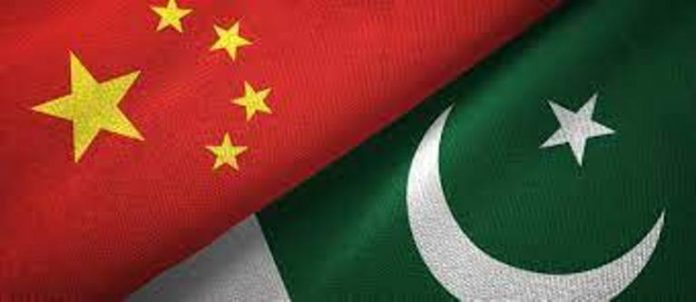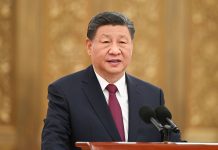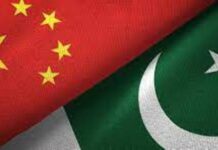Throughout that morning on October 14, Makhdoom gathered valuable content for her forthcoming book.
A native of Pakistan, she is a journalist and editor of China affairs at Pakistani newspaper The Daily Mail. Her work focuses on researching and reporting on the BRI.
The journalist first visited Beijing at the age of 10 as part of a family trip to the Chinese capital. As she grew up, she went on to travel to many other countries, but China continued to fascinate her.
In January of this year, she returned to China. While working as a journalist based in Beijing, she was also waiting to begin her Ph.D. studies at the city’s Communication University of China in September.
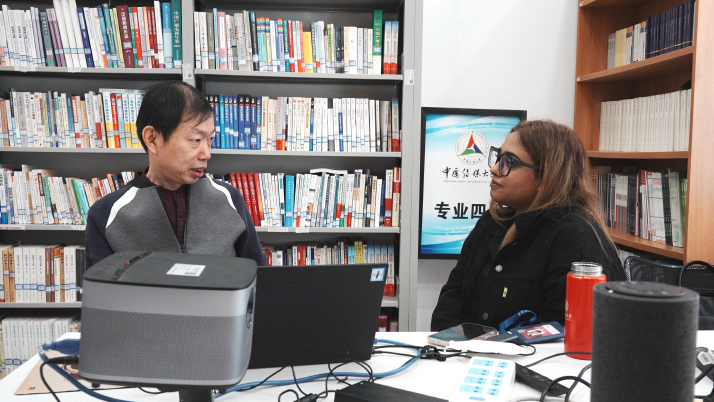
Camaraderie
The strong friendship between China and Pakistan is well known to almost everyone in China. Makhdoom told Beijing Review that when she was still in Pakistan, her parents had a Chinese friend whom they’d often invite to their home to enjoy Pakistani cuisine.
And whenever there was a festival, be it a Chinese or Pakistani one, this friend would come over and celebrate with Makhdoom’s family. “He was almost like family to us and we celebrated all our birthdays and special occasions with him,” the journalist added.
Friendship is a two-way street and the interaction between China and Pakistan has deepened over time. After once again setting foot on the Chinese mainland some 10 months ago, Makhdoom experienced a warm welcome and a kindness from the Chinese people that was different from her previous experiences in other countries.
“The difference between China and the other countries that I have been to, especially in the West, would be the people, the kind of warm welcome I’ve experienced in China. I don’t think I’ve experienced it anywhere else. People are so helpful and kind here. For me, that is the biggest difference,” she continued.
She recalled that when she just moved to Beijing, she couldn’t speak a word of standard Chinese. Whenever she got lost or needed help, she found that the Chinese people were incredibly eager to come to her aid, especially when learning she was from Pakistan. “I definitely feel quite at home here. So my plan is to live in China for as long as possible,” she said.
BRI benefits
The collaboration between China and Pakistan goes beyond people-to-people relationships and extends to a range of fields, including the economy, infrastructure development, energy and industrial cooperation.
One notable example is the China-Pakistan Economic Corridor (CPEC), a crucial project under the BRI. It is a massive bilateral effort aimed at improving infrastructure within Pakistan, facilitating trade with China and promoting South Asian integration.
Since its launch in 2015, the CPEC has been carried out under a “1+4” cooperation framework, with the “1” referring to CPEC and the “4” to energy, Gwadar Port, transportation infrastructure and industrial cooperation. Chinese investment is expected to significantly boost Pakistan’s GDP.
On July 31, the CPEC’s 10th anniversary was celebrated in Islamabad, capital of Pakistan. The country’s Prime Minister Muhammad Shahbaz Sharif expressed his deep gratitude to Chinese President Xi Jinping for valuing the corridor and Pakistan-China relations at large. The outstanding achievements of the corridor have profoundly changed the economic and social landscape of Pakistan.
On October 16, Yang Yundong, the Chinese Consul General in Karachi, published an article in Pakistani newspaper The Nation, highlighting that as of early October, the CPEC had brought $25.4 billion in direct investment to Pakistan, generated $17.55 billion in revenue, created 236,000 local jobs and helped add 6,000 megawatts of electricity to the national grid.
A beneficiary of the BRI herself, Makhdoom has developed a keen interest in the topic over time, and being a journalist based in Beijing has given her more opportunities to interact with expats from around the world living in China. She is currently working on a book that introduces the BRI and explores its impact on the countries and people along the route.
“Many people, especially young people, don’t really know what the BRI is. This book explains what it is, how it benefits all the countries involved, and it also focuses on short stories of people working on BRI projects or people who have been directly or indirectly affected by this initiative,” she explained.
What’s impressed her most during the writing process so far, have been the cultural exchange and educational opportunities that the BRI has generated. “Now, so many people can come to China and get a really good education because of the scholarships offered by this initiative. I think that’s one of the most beneficial outcomes of this initiative,” she said.
Opportunity abounds
In 2016, the General Office of the Central Committee of the Communist Party of China and the General Office of the State Council, China’s cabinet, issued a document titled Some Opinions on Doing a Good Job in Opening Up Education in the New Era.
The document called for implementing BRI education policies, promoting education cooperation with countries participating in the initiative, enhancing education connectivity and talent training, and adapting education measures to the development needs of Belt and Road countries.
In sum, it encouraged BRI participants to take joint action to achieve win-win cooperation.
China, for one, has since expanded its government scholarship program, establishing the Silk Road Scholarship Program. Under the program, every year, 10,000 new students from Belt and Road countries can receive a full scholarship to study in China or pursue their academic research here.
Compared to the economic impact, Makhdoom believes that education and cultural exchange can have a deeper and more far-reaching impact. She has met foreign students from small towns in their home countries who have been given the opportunity to further their education in China thanks to BRI scholarships. Charlie, the South African student she interviewed in Beijing, also came to China on a BRI scholarship.
As China and many countries around the world deepen cooperation in trade, investment and other areas, these international students can better participate in China-related work in governments and multinational companies because they are very familiar with the Chinese language, culture and systems.
More importantly, this process deepens cultural exchange between and mutual understanding among people from different countries. “When they return home, they can contribute to improving country-to-country relationships and enhancing people-to-people bonds,” Makhdoom said.
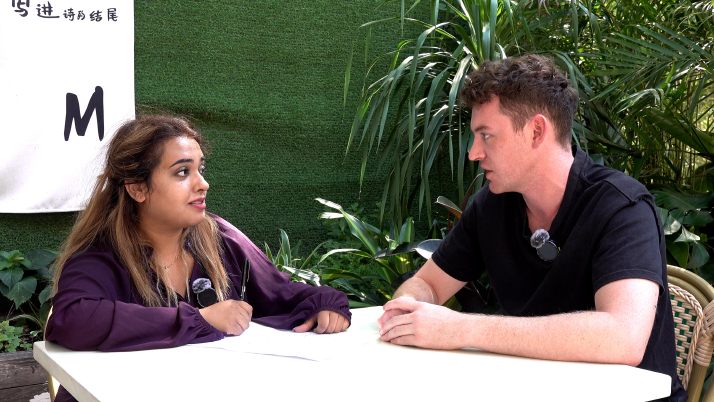
When asked about her future plans, Makhdoom replied that she aspires to leverage her expertise and professional background to share her genuine experiences of living in China with the world.
“I hope that, in the future, I can play a role in improving people-to-people relations and bridging the gap, not just between Pakistan and China, but also between China and different countries,” she concluded. –The Daily Mail-Beijing Review news exchange item

